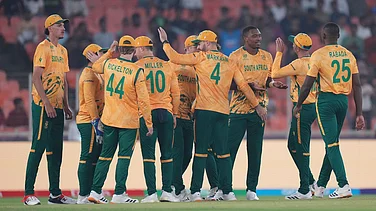It was pure cricket. But, honestly, did the 'noble' gesture accomplish anything beyond enabling the joint hosts of the Wills World Cup to cock a snook at Australia and the West Indies, which chickened out of their matches in Colombo in the aftermath of the truck bomb blast there? For many, it did. The match was a first: never before had a combined team of athletes drawn from India and Pakistan taken the field in any sporting discipline.
Pakistan's High Commissioner in New Delhi Riaz Khokhar calls it a "brilliant, thoughtful gesture expressing solidarity with Sri Lanka," though limited in scope.
The Sri Lankans are understandably delighted at the turn of events, as was evident from the overwhelming crowdresponse in Colombo. Sri Lanka's High Commissioner in New Delhi Mangala Moonesinghe echoes that sense of jubilation: "It's very encouraging that for the first time the South Asian region has come together for a cause. The message was loud and clear: nobody can insult the South Asian region or a body set up to conduct the World Cup in the subcontinent."
Indian and Pakistani players have played together before, notably in the World XI teams of 1970 and 1971-72 that toured England and Australia respectively to replace the scheduled tours by South Africa who had been banned from world cricket in 1970 for their apartheid policy. But this was the first time the cricket world witnessed a joint Indo-Pak squad.
Says Moonesinghe: "It's a question of principle and we should look at it dispassionately. If anyone had fears of playing in Sri Lanka, they could have come to PILCOM (the World Cup organisers) and said that we want you to take a decision on this issue. But they took it upon themselves to decide. The friendly match was a smart idea: a step forward for South Asian unity."
Sri Lanka Foreign Minister Lakshman Kadirgamar's response is equally effusive. He called the hurriedly organised Colombo game "a magnificent gesture for South Asia. It was a demonstration of solidarity and the implications are that the world will now take note of South Asia," he was quoted as saying after the match.
Former foreign secretary A.P. Venkateswaran sounds a note of caution. "I don't think it means anything other than that sports can be kept apart from politics. Obviously, the Indians and Pakistanis wanted to please the Lankans. That's hardly a sign of a thaw in Indo-Pak relations."
One man who played the World XI matches in the '70s (with Sunil Gavaskar, Farrokh Engineer and Bishen Singh Bedi) was former Pakistan captain Intikhab Alam. Now manager of the Pakistan team, he was put in charge of the Mohammed Azha-ruddin-led Indo-Pak XI team. He affirms that it was tremendous to see the team joke and enjoythemselves on the Colombo flight.
Remarkably, the match itself was organ-ised at 48 hours' notice in Calcutta after the emergency ICC (International Cricket Conference) meeting failed to either persuade PILCOM to change the venue of the two matches or Australia and West Indies to play them in Colombo as scheduled.
Any apprehensions the Pakistanis may have had about coming to India evaporated after the ecstatic reception accorded to them in Calcutta in the run-up to the opening ceremony. And when they were introduced to the massive crowd at the ceremony itself at the Eden Gardens, the spontaneity and duration of the roar that greeted them was second only to the welcome reserved for the home team.
"It's a very good sign that the two nations can cooperate at least in non-political areas," says Brahma Chellaney, professor of Security Research at the Centre for Policy Research. "This may lead to a lessening of tensions in political matters as well and has exposed Bal Thackeray's threat not to allow any Pakistani team to set foot in India. Cricket, it appears, has achieved what diplomacy has failed to do."






















